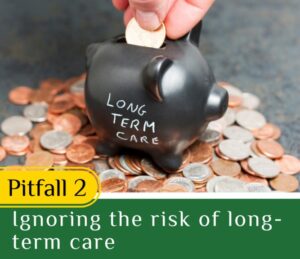Helping You Get Financially Prepared for Retirement
We all want a wonderful, worry-free retirement with enough money to achieve our Life Goals, Hopes and Dreams for this new season. Retirement should be a golden time. But failing to plan really does mean planning to fail when it comes to retirement.
Here are the top big mistake to avoid so you can plan for a retirement where your money goes to work for you!
 Pitfall #1: Not Downsizing or Paying Down Your Mortgage
Pitfall #1: Not Downsizing or Paying Down Your Mortgage
It’s crucial to minimize your expenses for retirement. This is particularly important when you aren’t earning any income. If you don’t keep your overhead down, you will have to cut back on your spending and draw on your resources more quickly than you would like.
One way to do that is with your mortgage or rent. Budget, plan and work to pay that off so you don’t have ongoing cost for living expenses to deal with.
Pitfall #2: Ignore the risk of long-term care
There are a lot of factors that go into calculating how long your money will last, including your age, your life expectancy, current rate of returns and long-term care is the biggest financial risk we face in retirement. Not only can it be expensive, but care can also extend for a long period of time. Many of us ignore the possibility of long-term care because it’s something we don’t want to think about. We also underestimate the chance we might need it.
Sometimes we think, it’s no problem, someone will just care for me. My spouse will care for me or my children will help out. We don’t realize what a strain that could be on others to provide that care for us. It’s vital to come up with realistic solutions in the event long-term care is needed. Closely examine your financial resources. Look into purchasing a financial product for your needs. Be prepared to be covered by a government Medicaid program
and the amount you have saved. We can help by giving you an approximate figure that you can safely withdraw each year without putting yourself at risk of running out of money.
 Pitfall #3: Not understanding how your portfolio works
Pitfall #3: Not understanding how your portfolio works
We’re mistaken if we believe being set for retirement is as simple as withdrawing a certain percentage of our 401(k) monthly. If we are not able to control our expenses or get the returns we want from our portfolio and limit our investment risks, that sum of money is going to reduce to the point that there will not be enough money in our 401(k) for us to maintain the standard of living for the rest of our lives.
What may have worked in your portfolio in your working years may not work when you’re retired. Your income will most likely not be the same, and you won’t have an extra financial cushion if you make errors or face bad results in the market.
 Pitfall #4: Too much or too little risk
Pitfall #4: Too much or too little risk
It’s normal practice to shift your money to lower-risk vehicles as you head nearer to retirement. You want to minimize risk if the market falls so you don’t lose a lot. The problem is that many view their portfolio as a whole, rather than parts. Years of experience have taught us that it’s wise to divide your portfolio into timeframes for withdrawals or your objectives for their use. One part can meet needs in the short-term with more liquidity and less risk. Another segment is for meeting long-term needs with higher risk, allowing you to access important growth opportunities.
 Pitfall #5: Not having legal documents in order
Pitfall #5: Not having legal documents in order
Planning for retirement means preparing for events we might rather ignore. Who wants to think about dying and whom to leave what to when we go? Who wants to talk about a scenario where we can’t care for ourselves and who will take care of us? These difficult topics are precisely why wills, living revocable trusts, and other legal documents are crucial. If we don’t get these legal documents in place, that doesn’t mean those events hap pen. It only means if and when they do happen, there will not be a proper structure in place to handle those affairs as we would like them to be handled. It becomes a potential problem for those that we expect will handle things for us.
 Pitfall #6: Not having beneficiaries on an investment account
Pitfall #6: Not having beneficiaries on an investment account
We can pass on assets to others in a few ways when we die. First, they can be jointly owned with the surviving owner takes possession of the assets. Otherwise, it is done through naming a beneficiary. If we don’t have joint ownership or name a beneficiary, then assets pass down through the stipulations in our will which can get messy. Don’t forget to designate beneficiaries in your will, otherwise your wishes may not be carried out.
 Pitfall #7: Transferring a Home/ Property to a Child Before Death
Pitfall #7: Transferring a Home/ Property to a Child Before Death
Most people assume their lifespans will be far shorter than statistics indicate, and they plan for their retirement accordingly. Unfortunately, the result of this trend is that many retirees outlive their savings. The best way to mitigate this risk is to assume a best-case scenario when planning for retirement. Save, invest and spend as if you will live to be 100 years old.
 Tip #8:Doing It All Yourself
Tip #8:Doing It All Yourself
Many of us think we’re good financial planners because we’ve had some success with our investments. However, that’s a potentially costly assumption. Financial planning is complex and complicated. By seeking the advice of experts who have dealt with a wide variety of situations, we get a plethora of experience and expertise. Trying to go it alone, may translate into lost opportunities to earn and save more.
 Pitfall #9: Focus on Sequence of Returns
Pitfall #9: Focus on Sequence of Returns
Before becoming retired (when planning for the future), it seems wise to move to a low-tax state where the cost of living is low. BUT this may not be the best emotional or financial choice after all. Moving far from family means more money spent on travel. Greater distance can lead to feeling far, disconnected, even estranged from close family and friends whose relationships mean so much in our golden years.
Financial success in retirement doesn’t happen by accident. It’s the result of planning. Dig in and do some work to avoid the top pitfalls that impede fulfillment in the golden years. There’s a lot to weigh but considering all the pieces, it’s important to avoid unforeseen pitfalls that can impact joy in retirement.
Have questions about minimizing your risk in retirement, or need help with your financial plan?
We’re here to help! Simply call or email to schedule a complimentary consultation today!
1-866-US Senior (1-866-877-3646) | AskUs@DedicatedFinancialServices.com
DOWNLOAD THE PDF









